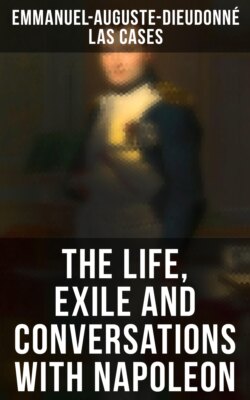Читать книгу The Life, Exile and Conversations with Napoleon - Emmanuel-Auguste-Dieudonné Las Cases - Страница 63
На сайте Литреса книга снята с продажи.
ORIGIN OF THE CORPS OF GUIDES.—ANOTHER DANGER
INCURRED BY NAPOLEON.—THE GERMAN OFFICER.
ОглавлениеTable of Contents
December 1st—3rd. Many incidents fill up this interval: some I reject as unnecessary, some it is proper I should withhold. I here note down only a few anecdotes of the General-in-chief of the Army of Italy.
After the passage of the Mincio, Napoleon, having concerted all his plans, and pursued the enemy in every direction, entered a castle on the left bank of the river. He was troubled with the head-ache, and he used a foot-bath. A large detachment of the enemy, in great confusion, arrived, having ascended the river as far as the castle. Napoleon had only a few persons with him; the sentinel on duty at the gate had just time to close it, exclaiming, “To arms!” and the General of the Army of Italy, in the hour of victory, was compelled to escape through the back gates of the garden, with but one boot on. Had he been made prisoner, before his reputation was established, the acts of genius which had marked the commencement of his career would, perhaps, by the common run of mankind, have been considered merely as fortunate and blameable enterprises. The danger which the French General had just escaped (a circumstance which, through his method of operations, was likely often to recur) was the origin of the guides appointed to guard his person. These guides have since been introduced in other armies.
In the same campaign, Napoleon incurred another imminent risk:—Wurmser, who had been compelled to throw himself into Mantua, and who was debouching suddenly on an open plain, learned from an old woman, that, only a few moments before his arrival, the French General, with but a few followers, had stopped at her door, and that he had fled within sight of the Austrians. Wurmser immediately despatched parties of cavalry in every direction, calculating with certainty on the precious capture. “But,” said the Emperor, “I must do him this justice, he gave particular orders that I should not be killed or harmed in any way.” Fortunately for the young General, his happy star and the swiftness of his horse preserved him.
The new system of military operations practised by Napoleon disconcerted every one. The campaign was scarcely opened, when Lombardy was inundated with troops in every direction, and the French approached Mantua pell-mell with the enemy. The General-in-chief, when in the neighbourhood of Pizzighitone, met a great fat German Captain or Colonel, who had been made prisoner. Napoleon took a fancy to question him, without being known, and enquired how affairs were going on. “Very badly,” replied the officer; “I know not how it will end; but no one seems to understand what is doing; we have been sent to fight a young blockhead, who attacks you on the right and the left, in front and in rear, so that there is no knowing how to proceed. This mode of carrying on war is intolerable; and for my part, I am very glad to have done with it....”
Napoleon used to relate that, after one of his great actions in Italy, he passed over the field of battle with two or three other persons, before the dead bodies had been interred. “In the deep silence of a beautiful moonlight night,” said the Emperor, “a dog, leaping suddenly from beneath the clothes of his dead master, rushed upon us, and then immediately returned to his hiding-place, howling piteously. He alternately licked his master’s face, and again flew at us; thus, at once soliciting aid and seeking revenge. Whether owing to my own particular turn of mind at the moment,” continued the Emperor, “the time, the place, or the action itself, I know not; but certainly no incident on any field of battle ever produced so deep an impression on me. I involuntarily stopped to contemplate the scene. This man, thought I, perhaps has friends in the camp or in his company; and here he lies forsaken by all except his dog! What a lesson Nature here presents through the medium of an animal! What a strange being is man! and how mysterious are his impressions; I had, without emotion, ordered battles which were to decide the fate of the army; I had beheld, with tearless eyes, the execution of those operations, by which numbers of my countrymen were sacrificed; and here my feelings were roused by the mournful howling of a dog! Certainly at that moment I should have been easily moved by a suppliant enemy; I could very well imagine Achilles yielding up the body of Hector at the sight of Priam’s tears.”
